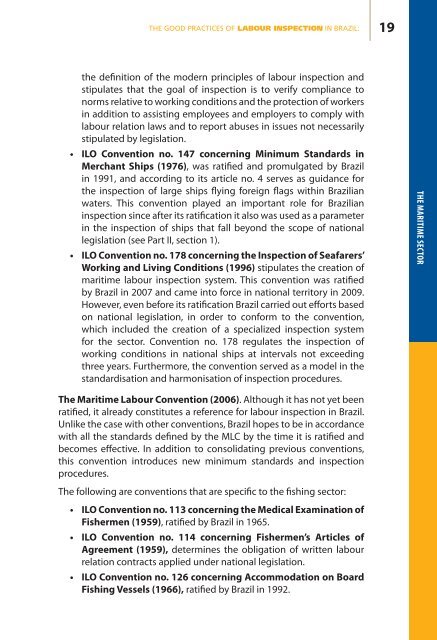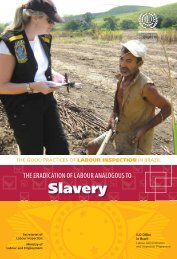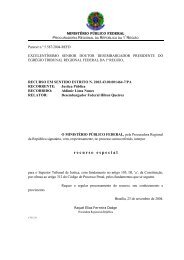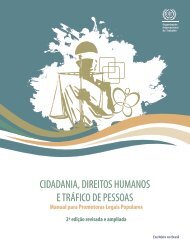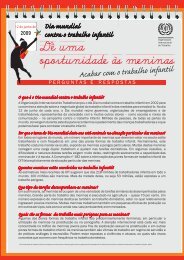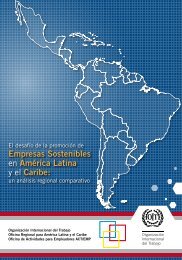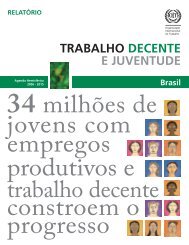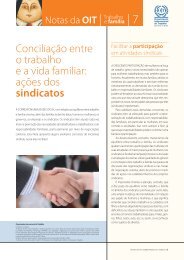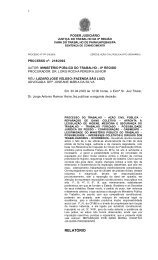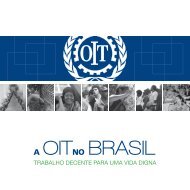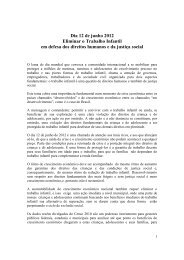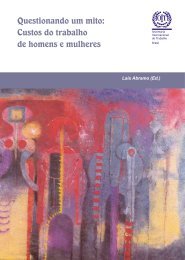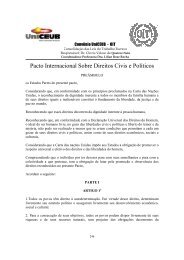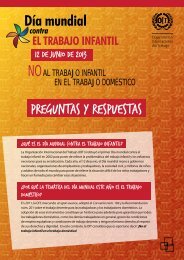The Maritime Sector
The Maritime Sector
The Maritime Sector
You also want an ePaper? Increase the reach of your titles
YUMPU automatically turns print PDFs into web optimized ePapers that Google loves.
THE GOOD PRACTICES OF LABOUR INSPECTION IN BRAZIL: 19the definition of the modern principles of labour inspection andstipulates that the goal of inspection is to verify compliance tonorms relative to working conditions and the protection of workersin addition to assisting employees and employers to comply withlabour relation laws and to report abuses in issues not necessarilystipulated by legislation.• ILO Convention no. 147 concerning Minimum Standards inMerchant Ships (1976), was ratified and promulgated by Brazilin 1991, and according to its article no. 4 serves as guidance forthe inspection of large ships flying foreign flags within Brazilianwaters. This convention played an important role for Brazilianinspection since after its ratification it also was used as a parameterin the inspection of ships that fall beyond the scope of nationallegislation (see Part II, section 1).• ILO Convention no. 178 concerning the Inspection of Seafarers’Working and Living Conditions (1996) stipulates the creation ofmaritime labour inspection system. This convention was ratifiedby Brazil in 2007 and came into force in national territory in 2009.However, even before its ratification Brazil carried out efforts basedon national legislation, in order to conform to the convention,which included the creation of a specialized inspection systemfor the sector. Convention no. 178 regulates the inspection ofworking conditions in national ships at intervals not exceedingthree years. Furthermore, the convention served as a model in thestandardisation and harmonisation of inspection procedures.THE MARITIME SECTOR<strong>The</strong> <strong>Maritime</strong> Labour Convention (2006). Although it has not yet beenratified, it already constitutes a reference for labour inspection in Brazil.Unlike the case with other conventions, Brazil hopes to be in accordancewith all the standards defined by the MLC by the time it is ratified andbecomes effective. In addition to consolidating previous conventions,this convention introduces new minimum standards and inspectionprocedures.<strong>The</strong> following are conventions that are specific to the fishing sector:• ILO Convention no. 113 concerning the Medical Examination ofFishermen (1959), ratified by Brazil in 1965.• ILO Convention no. 114 concerning Fishermen’s Articles ofAgreement (1959), determines the obligation of written labourrelation contracts applied under national legislation.• ILO Convention no. 126 concerning Accommodation on BoardFishing Vessels (1966), ratified by Brazil in 1992.


